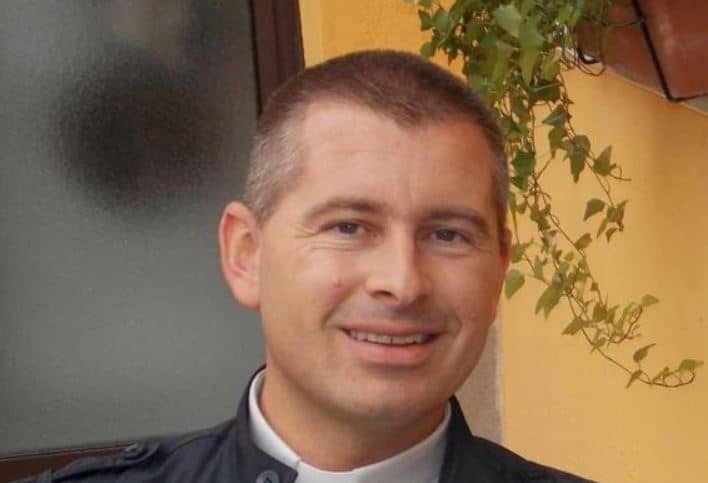In response to Pope Francis’s request that presidents of bishops’ conferences meet with clerical abuse victims ahead of his Feb. 21-24 summit, Polish Archbishop Stanisław Gądecki, who heads the conference in Poland, has begun meeting 28 victims, saying they’ve made him “more sensitive to the experienced harm.”
The meetings with Gądecki, some of which are scheduled to take place after he returns from Rome, are individual and private. They’re taking place on “neutral” ground, not at church venues.
“They were very much needed for both sides.” Gądecki said in a statement. “I would like to emphasize that each of these meetings was important to me. Each of them expanded my knowledge.”
Those present said the archbishop was very moved by the meetings, many of them prolonged for several hours.
Gądecki made an appeal to perpetrators after the meeting: “I call you to examine your conscience, to recognize your responsibility before God and the people. Your actions destroy the young and the Church,” he added, asking all faithful to join in a “fervent prayer” for the victims and for the conversion of the perpetrators.
Wiktor Porycki was one of the victims who met Gądecki. He was molested by a parish priest when he was 15 and preparing for his confirmation. For years, he said he blamed himself for what happened. Only recently, he said, “on the wave of releasing cases in the Church” he decided to reveal his trauma to a priest.
“To this day I feel dirty because of what happened. I can’t take this feeling away from me,” he wrote for Polish quarterly Więź (“The Bond”).
Porycki said Gądecki was truly touched and shocked during their meeting, and, in his opinion, those emotions were generous and honest.
He doesn’t fault the Church for what happened, yet he reported to Gądecki that he wrote to the bishop of his diocese four months ago and, to this day, he is waiting for an answer.
Father Adam Żak, a bishops’ conference delegate on sex abuse who was present at the meetings, told Crux that what survivors typically ask is quite simple.
“Most victims in general want one thing – so that their perpetrators change and understand their crime and that they don’t hurt anyone else,” he said.
Żak’s hope for the pope’s summit is that its actions and speeches will be reported with details to the rest of the Polish bishops, and that they will follow the example of Gądecki in meeting victims in their dioceses.
The Polish bishops’ conference adopted regulations in cases of clerical sex abuse as early as June 2009, even before general directions were issued by the Vatican’s Congregation for the Doctrine of the Faith. In a document originally developed in 2013, and then adopted in 2015 after incorporating Vatican suggestions, the Polish bishops declared a “zero tolerance” policy for pedophilia inside the Church.
Yet dealing with the issue remains problematic, as only 5 out of 44 diocesan bishops in Poland have released their numbers of priest perpetrators. Those dioceses are Płock, Opole, Warsaw-Prague, Pelpin and the Diocese of the Military Ordinariate.
Tomasz Krzyżak, a Polish journalist covering the Church for two decades, said that collectively, the Polish bishops act with a “besieged fortress” attitude.
“Back in the Communist times, unanimous statements were crucial for making the Church survive,” he said. Today, Krzyżak said, decisions concerning sex abuse seem to be treated with the same attitude.
In November, a letter to the faithful was drafted by the bishops titled, “The Polish Church and the sin and crime of pedophilia.” When it came time to vote, however, the bishops didn’t agree to read the letter to the faithful in churches during Mass. Instead, it was published on the website of the Polish bishops’ conference.
Likewise, no decision has been made on empaneling a commission to examine the case of Father Henryk Jankowski, a legendary Solidarity cleric accused in December 2018 of being a sexual perpetrator.
“The Jankowski case is a test for the Polish bishops’ conference,” Krzyżak said. “It’s a question of transparency, both in examining whether the accusations are true and in the case of possible abuse of power by bishops that may have known about it.”
The conference has asked local dioceses to collect data on clerical sex abuse, but the date of releasing those findings isn’t known.
On the positive side of the ledger, however, the Polish Church has a delegate for sex abuse in each of its 44 dioceses, and it’s own Center for Child Protection run by the Jesuits in Krakow. Over the last 5 years of operations, it’s trained more than 3,000 people – mostly priests, but also laity working with minors such as school and preschool management and teachers. It also became a reference point to Eastern European bishops conferences, training people in Ukraine and Russia.
In a conversation with Crux, Żak said he hopes that what the Church is achieving to fight sex abuse will also be adopted in the country’s legislature.
“While concentrating on the ‘church’ victims, the majority of victims of sex abuse in families, schools and sports clubs are completely forgotten,” he said, arguing that needs to change with a national program of protection for minors.

















